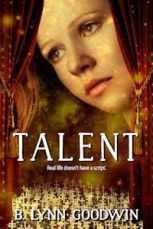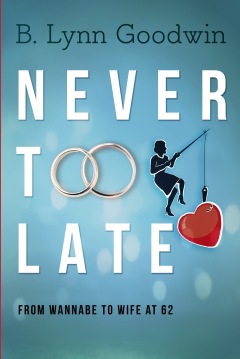
SM: This may sound a little strange, but I’m going to interview my author, B. Lynn Goodwin about the book she wrote before mine.
You see I’ve been learning a few things about care giving since I met a girl named Tessa. You’ll meet her when you read Talent. Her sister came back from Afghanistan with some kind of a brain injury. She’s still in a coma, but Tessa’s keeping a journal for her to help her when she wakes up. So, Lynn, my first question would be is Tessa’s journal like your book?
BLG: A little bit. In both cases caregivers are relieving stress by writing their stories one incident at a time and one feeling at a time.
They are processing their thoughts as they write them down. There’s something about slowing down and putting pen to paper or fingers to keyboard that makes what’s happening more manageable. You don’t deny thoughts the minute they flit into your brain. Instead you deal with them.
SM: Cool. That’s like my journal for English class, except I try not to say anything too personal there.
BLG: You can be as personal as you want when you journal for yourself. So who else would this journal be good for?
SM: Maybe my mom. Maybe even my dad. They can’t get over what happened to my brother, Bri. Not that I blame them. But it totally sucks—I mean it’s totally hard—to be me right now. They hardly even know I’m around.
BLG: So they could process what happened to Bri and how they are coping?
SM: Wait a minute. I’m supposed to be asking the questions! Do you have to journal every day?
BLG: Write when you want to. Write as often as you want to. Some people set a timer for 10 minutes. Some people keep going long after 10 minutes.
SM: Where did those 200 sentence starts come from?
BLG: Good questions, Sandee. I’m not sure anyone ever asked me that before. I first wrote them for my students. They were tenth graders who kept saying, “There’s nothing to write about.” So I started saying, “Finish that sentence start on the board and just keep going.”
SM: Did it work?
BLG: Would it work in your English class?
SM: It would for some people.
BLG: Exactly. When I used sentence starts with more motivated people, like drama students developing their characters or my free writing group, people used them to start. They let one idea lead to the next.
SM: So are journaling and free writing the same?
BLG: Free writing is a form of journaling.
SM: So I think I might like a copy of the book for Tessa, and I think I should get Mom and Dad separate books. So how do I get it?
BLG: Go to Amazon. I know you know about Amazon because they sell your story, Talent too. The Amazon page for You Want Me to Do WHAT? Journaling for Caregivers is You Want Me to Do WHAT? The page for Talent is Talent.
SM: Thanks for letting me interview you. Maybe I should take up journalism.
BLG: It’s okay with me, but you’ll have to wait until I get my newest book published before I can tell more of your stories, Sandee. I’ll tell you more about that book in our next interview.


Love this, Lynn. Teacher, student – you and Sandee are two wonderful women! Look forward to your next interview!
LikeLike
Thanks, Mary Jo. If I can fit it in, Sandee and I want to interview some YA authors. 😉
LikeLiked by 1 person
What you are doing is so novel, in my experience, and fascinating. Kudos, Lynn!
LikeLiked by 1 person
Thank you, Mary Jo. I’m taking that with me as I head out into the world. My insides are smiling and so is my face.
My terrier, Eddie McPuppers, just told me he wants to interview Spike (Bri’s dog). Do you think Spike has his own typist like Eddie does?
LikeLike